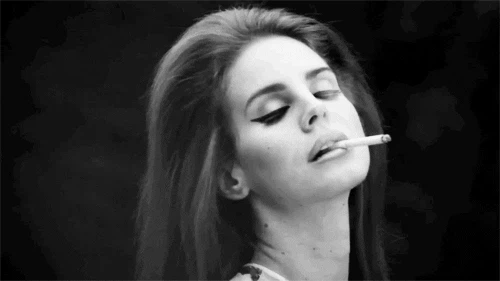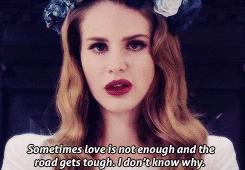Lana Del Rey Reflects On Being Deemed A "Fake Feminist" In A New Interview With The Times
Lana Del Rey is reflecting on her toughest years of criticism with The Times this week.

"I will never sing again," she cries in Swan Song, and now we know why. Lana Del Rey is recounting instances where she got books thrown at her by liberal women, was punched in the face in Brooklyn, and was labeled a fraud and a "fake feminist" in her latest interview with The Times this week.
"I get dressed up for my shows while some folks don't. For some reason that was a problem. I had books thrown at me in San Francisco by liberal female groups. I've been punched in the face in Brooklyn. Ten years ago, mentally I badly needed some beauty to come out of the chaos. For something to make sense. I've been on guard for so long" she says.
This is hardly Del Rey's first rumble with feminists, however.
Uncovering the inconsistencies of the feminist movement has been backbreaking work for women for what seems like an eternity. Feminism used to truly be about women’s equal rights, but now it’s often used as a crusade to radicalize women into rejecting any type of femininity or traditional lifestyle. So it was very on-brand for feminists to go after singer Lana Del Rey in 2020 too, when they accused her of being racist for a post she made questioning why she’s being labeled anti-feminist.
Does Lana Del Rey’s Music “Glamorize Abuse?”
For years, other celebrities and journalists have called out Del Rey’s music for “glamorizing abuse” and being “anti-feminist.” This article from 2015 accuses her of outdated, anti-feminist ideas (and it’s not the only one): “Not only does she fail to condemn this outdated male-female power dynamic of inequality, but she willingly portrays herself as being valued almost solely in her sexuality, with lines like ‘I’m your little harlot,’ and ‘If I get a little prettier, can I be your baby?’”

But Del Rey has been willing and able to recognize that certain lyrics from her songs are very harmful, like this line from her song “Ultraviolence”: “He hit me and it felt like a kiss.” She says she won’t sing the line anymore, but at the time, it felt like the truth. If she’s writing about her experience with emotional and physical abuse as a way to deal with and resolve her trauma, why aren’t there more feminists on her side?
Is It Racist To Call Out Other Artists?
Del Rey posted the now infamous letter on her Instagram three years ago, where she points out that other female artists sing about “being sexy, wearing no clothes, f**king, cheating, etc.” and yet she gets accused of “glamorizing abuse” with her lyrics.
“Let this be clear, I’m not not a feminist,” added Del Rey, “but there has to be a place in feminism for women who look and act like me – the kind of woman who says no but men hear yes – the kind of women who are slated mercilessly for being their authentic, delicate selves.”
She’s not wrong – a lot of what we hear in music on the radio is extremely damaging to women. And it’s not just in music made by women, but some of the ways men sing about women are so disgusting and degrading that it’s hard to believe the music is accepted by a supposedly “feminist” mainstream culture. If we’re going to spend time focusing on how Del Rey’s music may hurt young women, let’s also spend time looking at how everyone in the music industry is complicit in perpetuating dangerous and degrading narratives about women.

Strangely enough, Del Rey was accused of being “racist” because some of the women she mentioned are people of color. It seemed as if everyone criticizing and picking her apart for this statement conveniently pivoted the conversation to be about race when it was quite literally about the double standards in feminism. But because Lana Del Rey writes songs about women struggling with the pitfalls of feminine nature, they don’t want her.
Closing Thoughts
Lana’s feelings shouldn’t be tossed away because she doesn’t align with the mainstream narrative of “empowered women.” All women should be welcome in the feminist movement, even those who struggle to stand up for themselves. Otherwise, all we’re doing is abandoning them to their fate, instead of helping all of us rise up together.
Evie deserves to be heard. Support our cause and help women reclaim their femininity by subscribing today.